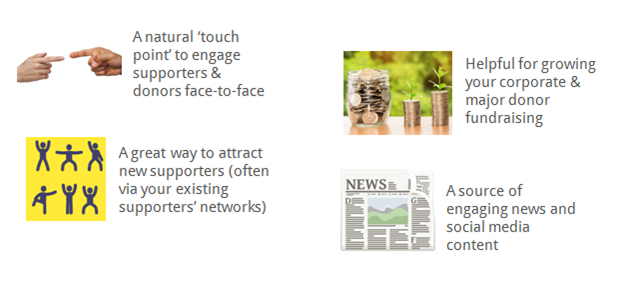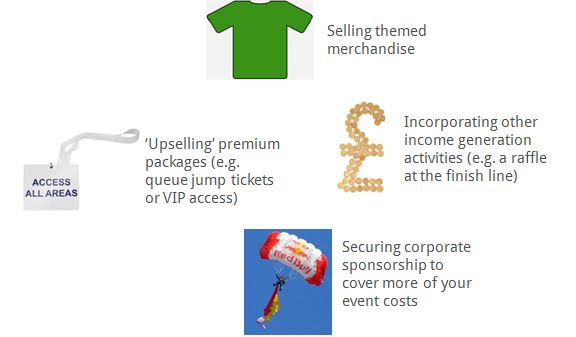|
Statistically, events fundraising has never been one of the more profitable forms of fundraising. While both special events (e.g. a gala dinner or concert) and challenge events (e.g. a marathon or sporting challenge) can sometimes raise a lot, promotion costs are often high and a lot of staff time is required. For example, while you might expect a return on investment of 10:1 (£10 raised for every £1 spent) from trusts fundraising, or 5:1 from corporate fundraising, events are often closer to 2:1 or 3:1. Even this figure is decreasing as fundraising events are hit by the current financial climate, market saturation and supporter fatigue (the challenge of keeping on going back to the same limited pool of supporters). If you have a small fundraising team, you’d be forgiven for wondering whether it’s worth your time committing to new fundraising events at all. So in what circumstances are events still worth your time, and how do you decide whether they’re right for you? Despite the challenges, events provide plenty of advantages, not all of them related to short-term income: To capitalise on these advantages, you need to be crystal clear what you’re looking to achieve from your fundraising events, and plan accordingly MAXIMISING THE BENEFITS OF SPECIAL EVENTSSpecial events are excellent for engaging corporate and major donor prospects, encouraging existing supporters to introduce people from their own network, and recognising the contributions of key supporters. Particularly when your event features stories and speeches from the people you support, or creates an inspiring and celebratory atmosphere, or when senior staff and trustees are on hand to mingle with people. When planning an event, liaise with people across your organisation to map out who should be invited. Then invite them well in advance, warmly, and with a personal message. Depending on how much you want them to be there, you can consider offering discounted or free tickets where appropriate, particularly if the long-term benefits outweigh the short-term cost. On the night, make sure key prospects get plenty of time and attention, and take every opportunity to educate and inspire them about your organisation’s work. If you have a long-term plan about how you ideally want them to support your cause, you might be able to cunningly sow some seeds on the night. Carry on the personal touch after the event, by thanking people and sending any follow-up material promptly, personally and creatively (for example with a handwritten card or colourful social media image). This often requires some advance planning, particularly if staff plan to take some much-needed time off after your event. Bear in mind that high-value prospects expect ‘senior’ attention, so you need to enlist support from management and trustees at every stage - before, during and after your event. Particularly for corporate and major donor fundraising, it's rare to be successful without senior level buy-in. MAXIMISING THE BENEFITS OF challenge EVENTSBuilding long-term relationships with challenge event participants is typically much harder, but not impossible. Firstly, you need to consider whether this is a realistic goal at all. This will depend on the nature of your event. If it's a big brand in its own right, or if it has no natural link to your cause, people are more likely to be participating in the event on its own merits, and have less natural interest in supporting you further. If your event has a high fundraising target - or, perhaps more importantly, involves a bigger fundraising effort - this provides greater scope to engage people further. If you're trying to keep people engaged for the long term, a few things can really help:
If 'converting' participants into long-term supporters feels unlikely, it could be better to focus on maximising short-term profit instead. This can be achieved through: STAYING FOCUSED ON THE BIGGER PICTUREMany events potentially bring broad benefits, but often fundraisers only give this serious thought once it’s too late. When we take part in events, we’re often told it’s not the winning that counts, but the taking part. However, with a successful fundraising event, perhaps it’s not (just) the taking part that counts, but what happens next.
You need to think about this bigger picture from the very beginning, as soon as you start the planning process. It should dictate how you design your event, how you communicate with participants and which of your colleagues you ask to be involved. If you do decide that your event has a higher purpose, make sure this is reflected in the evaluation process too. I’ve seen fundraisers get persuaded by colleagues to do an event because it has awareness-raising potential as well as income potential – but when push comes to shove, management lose sight of these objectives and only measure the return in hard cash. This can result in giving up on events early, or sacrificing the long-term benefits. It sounds obvious, but if your event is primarily about long-term value, you need to find ways of actually measuring that value, and convincing people that results will take time to become visible.
0 Comments
Leave a Reply. |
Like this blog? If so then please...
Categories
All
Archive
May 2024
|
Lime Green Consulting is the trading name of Lime Green Consulting & Training Ltd (registered company number 12056332)



 RSS Feed
RSS Feed